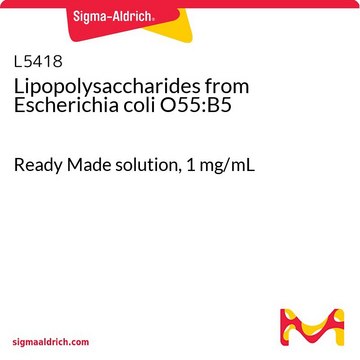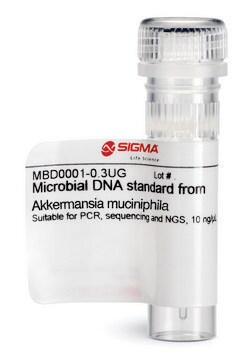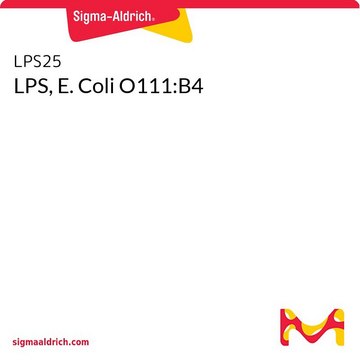SBR00027
Lipopolysaccharides from Akkermansia muciniphila
Purified by phenol extraction
Faça loginpara ver os preços organizacionais e de contrato
About This Item
Código UNSPSC:
12352201
NACRES:
NA.25
Produtos recomendados
fonte biológica
(Akkermansia muciniphila)
Nível de qualidade
Formulário
lyophilized powder
cor
white to faint yellow
solubilidade
water: 1 mg/mL, faintly hazy to hazy, colorless to light yellow
temperatura de armazenamento
2-8°C
Descrição geral
Akkermansia muciniphila (A. muciniphila) is a Gram-negative, anaerobic, non-motile, non-spore-forming, and oval-shaped bacterium. A. muciniphila inhabits the gastrointestinal tracts of more than 90% of adults and constitutes 1-4% of the fecal microbiota. A. muciniphila levels were suggested to serve as a biomarker for a healthy intestine.
Lipopolysaccharides (LPS) are complex molecules composed of lipids and polysaccharides that are predominantly found in the outer membrane of Gram-negative bacteria. They consist of three main components: lipid A, the core oligosaccharide (core), and the O-specific polysaccharide or O antigen (OAg). Lipid A is firmly linked to the outer bacterial membrane and is primarily responsible for the toxicity associated with LPS. LPS serves as a potent activator of the proinflammatory response in various types of mammalian cells, including macrophages, monocytes, and endothelial cells. Beyond its protective role for Gram-negative bacteria against environmental stress, LPS is also recognized by the innate immune system during infection.
Aplicação
Lipopolysaccharides may have been used as a cell culture treatment:
- to impair barrier functions of Caco-2 cell monolayers tight junction
- cocultured along with A. muciniphila to study its effects on the NLR family pyrin domain containing 3 (NLRP3) expressions in Raw264.7 cells
- to activate HepG2 cells as an endotoxin together with palmitic acid (PA)
Ações bioquímicas/fisiológicas
LPS and its lipid A moiety stimulate cells of the innate immune system by the Toll-like receptor 4 (TLR4), a member of the Toll-like receptor protein family, which recognizes common pathogen-associated molecular patterns (PAMPs).,
A. muciniphila degrades mucus and utilizes it as a carbon/nitrogen source. Consequently, the host produces additional mucus while the bacterium produces oligosaccharides and Short Chain Fatty Acids (SCFAs) that can be utilized by the host and trigger the immune system. An additional protective effect of the SCFA is stimulation of mucus-associated microbiota growth, that serves as a barrier against penetration of pathogens to intestinal cells.,
A. muciniphila was crowned as the next-generation beneficial microbe. Several reports have indicated that A. muciniphila affects glucose metabolism, lipid metabolism, and intestinal immunity. In addition, decreasing levels of A. muciniphila are related to the development of some diseases such as metabolic disorders and inflammatory diseases (obesity, type 2 diabetes, inflammatory bowel disease (IBD), autism and atopy. Weir et al. found a correlation between low level of A. muciniphila and colorectal cancer. Shigemetzu Y et al. found that A. muciniphila acts as a regulator of the response to PD-1 blockade which is used for anti-cancer immunotherapy. A. muciniphila induce dendritic cells to secrete IL-12, that is a critical component of the anti-cancer effect of PD-1 blockade.
LPSs from A. muciniphila stimulate NF-κB dependent secreted embryonic cell alkaline phosphatase (SEAP) production via TLR4. In addition, it induces IL-8, IL-6 and minimal amounts of IL-10 and TNF-α in peripheral blood mononuclear cells (PBMCs). A. muciniphila stimulation of IL-8 production by enterocytes was shown to be significantly (100 fold) lower than E. coli stimulation. Low proinflammatory activity keep the mucosa-associated immune system alerted at an appropriate level for generation of mucosal homeostasis.
A. muciniphila degrades mucus and utilizes it as a carbon/nitrogen source. Consequently, the host produces additional mucus while the bacterium produces oligosaccharides and Short Chain Fatty Acids (SCFAs) that can be utilized by the host and trigger the immune system. An additional protective effect of the SCFA is stimulation of mucus-associated microbiota growth, that serves as a barrier against penetration of pathogens to intestinal cells.,
A. muciniphila was crowned as the next-generation beneficial microbe. Several reports have indicated that A. muciniphila affects glucose metabolism, lipid metabolism, and intestinal immunity. In addition, decreasing levels of A. muciniphila are related to the development of some diseases such as metabolic disorders and inflammatory diseases (obesity, type 2 diabetes, inflammatory bowel disease (IBD), autism and atopy. Weir et al. found a correlation between low level of A. muciniphila and colorectal cancer. Shigemetzu Y et al. found that A. muciniphila acts as a regulator of the response to PD-1 blockade which is used for anti-cancer immunotherapy. A. muciniphila induce dendritic cells to secrete IL-12, that is a critical component of the anti-cancer effect of PD-1 blockade.
LPSs from A. muciniphila stimulate NF-κB dependent secreted embryonic cell alkaline phosphatase (SEAP) production via TLR4. In addition, it induces IL-8, IL-6 and minimal amounts of IL-10 and TNF-α in peripheral blood mononuclear cells (PBMCs). A. muciniphila stimulation of IL-8 production by enterocytes was shown to be significantly (100 fold) lower than E. coli stimulation. Low proinflammatory activity keep the mucosa-associated immune system alerted at an appropriate level for generation of mucosal homeostasis.
Outras notas
For additional information on our range of Biochemicals, please complete this form.
To gain a comprehensive understanding of our extensive range of Lipopolysaccharides for your research, we encourage you to visit our Carbohydrates Category page.
Palavra indicadora
Danger
Frases de perigo
Declarações de precaução
Classificações de perigo
Acute Tox. 2 Oral
Código de classe de armazenamento
6.1A - Combustible acute toxic Cat. 1 and 2 / very toxic hazardous materials
Classe de risco de água (WGK)
WGK 3
Ponto de fulgor (°F)
Not applicable
Ponto de fulgor (°C)
Not applicable
Escolha uma das versões mais recentes:
Certificados de análise (COA)
Lot/Batch Number
Lamentamos, não temos COA para este produto disponíveis online no momento.
Se precisar de ajuda, entre em contato Atendimento ao cliente
Já possui este produto?
Encontre a documentação dos produtos que você adquiriu recentemente na biblioteca de documentos.
Microbes inside?from diversity to function: the case of Akkermansia.
Blezer C and DE Vos WM.
The ISME Journal, 6(8), 1449-1458 (2012)
Mucolytic bacteria with increased prevalence in IBD mucosaaugment in vitro utilization of mucin by other bacteria.
Png CW, Linden SK, Gilshenan KS, Zoetendal EG, McSweeney CS, Sly LI, McGuckin MA, Florin TH.
The American Journal of Gastroenterology, 105(11), 2420-2428 (2010)
LPS/TLR4 signal transduction pathway.
Lu YC, Yeh WC, Ohashi PS.
Cytokine, 42(2), 145-151 (2008)
Siwen Qu et al.
Microbiology spectrum, 9(2), e0073021-e0073021 (2021-10-07)
Akkermansia muciniphila has been proved to play a crucial role in the progression of colitis, but its underlying mechanism remains inconclusive. In this study, we aim to investigate the effect of A. muciniphila on the development of acute colitis and
Gut microbiome: a key player in cancer immunotherapy.
Shigematzu Y et al,
Hepatobiliary surgery and nutrition, 7(6) (2018)
Nossa equipe de cientistas tem experiência em todas as áreas de pesquisa, incluindo Life Sciences, ciência de materiais, síntese química, cromatografia, química analítica e muitas outras.
Entre em contato com a assistência técnica





